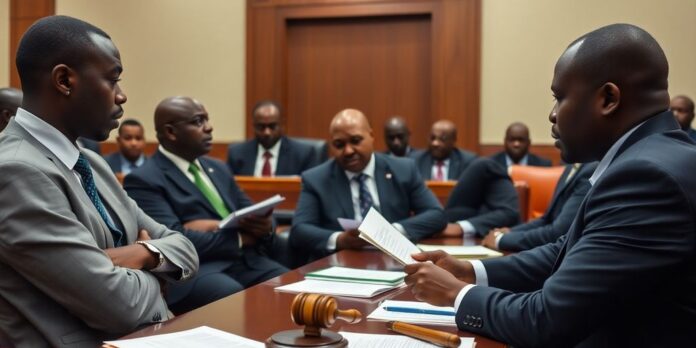A significant legal development has unfolded in Nigeria as the Chief Judge of the Federal High Court, Justice John Tsoho, has ordered the transfer of all cases challenging the emergency rule declared in Rivers State from the Port Harcourt division to Abuja. This decision follows a request from the Attorney General of the Federation, Lateef Fagbemi, and has sparked mixed reactions among legal practitioners and political figures.
Key Takeaways
- All cases related to the emergency rule in Rivers State are now to be heard in Abuja.
- The transfer was initiated by the Attorney General’s request, citing procedural rules.
- Legal experts and former lawmakers have criticized the transfer, calling it manipulative.
- The cases involve significant political figures, including the suspended Governor Siminalayi Fubara.
Background of the Emergency Rule
In May 2025, President Bola Tinubu declared a state of emergency in Rivers State, citing ongoing political instability. This declaration led to the suspension of key political figures, including Governor Siminalayi Fubara and his deputy, Prof. Ngozi Odu. The emergency rule has been met with widespread criticism and legal challenges from various stakeholders.
Details of the Transfer
The Chief Judge’s decision to transfer the cases was made in accordance with Order 49, Rule 2 of the Federal High Court (Civil Procedure) Rules, 2019. The following cases have been affected by this transfer:
- Dr. Farah Dagogo v. President & 4 Others (Suit No: FHC/PH/CS/50/2025)
- Pilex Centre for Civic Education Initiative & Another v. The Administrator (Suit No: FHC/PHC/CS/46/2025)
- Incorporated Trustee of Rivsbridge Peace v. President & Others (Suit No: FHC/PH/SC/43/2025)
- Incorporated Trustee of People’s Life Improvement Foundation & Others v. The President & 2 Others (Suit No: FHC/PH/SC/2025)
- Belema Briggs & 4 Others v. The President & Others (Suit No: FHC/PH/SC/51/2025)
- Samuel T. O. Amatonje Esq v. The President & Others (Suit No: FHC/PH/SC/53/2025)
Reactions to the Transfer
The transfer has drawn criticism from various quarters. Dr. Farah Dagogo, a former federal lawmaker and one of the plaintiffs, has publicly denounced the move, labeling it as an attempt to manipulate the judicial process. He argues that the transfer lacks a clear legal basis and undermines the right to a fair hearing, as enshrined in the Nigerian Constitution.
Samuel Amatonjie, another plaintiff, expressed his surprise upon learning of the transfer when he arrived at the court for a scheduled hearing. He emphasized the need for a speedy resolution to the matter, given its implications for governance in Rivers State.
Implications for Governance in Rivers State
The ongoing legal battles surrounding the emergency rule in Rivers State are not just a matter of legal procedure; they have significant implications for the political landscape of the state. The suspension of the governor and other officials has created a power vacuum, leading to concerns about governance and stability in the region.
As the cases move to Abuja, the focus will be on how the judiciary handles these politically charged matters. The outcome could set a precedent for future declarations of emergency in Nigeria and influence the balance of power between state and federal authorities.
In conclusion, the transfer of these cases to Abuja marks a pivotal moment in the ongoing struggle over governance in Rivers State. As legal proceedings unfold, all eyes will be on the courts to see how they navigate the complex interplay of law and politics in this critical situation.
Sources
- Court transfers suits challenging Rivers’ emergency rule to Abuja, The Guardian Nigeria News.
- CJ transfers six Rivers emergency rule suits to Abuja, Punch Newspapers.
- Ex-Federal Lawmaker Faults Transfer of Suits from Port Harcourt to Abuja – THISDAYLIVE, THISDAYLIVE.


